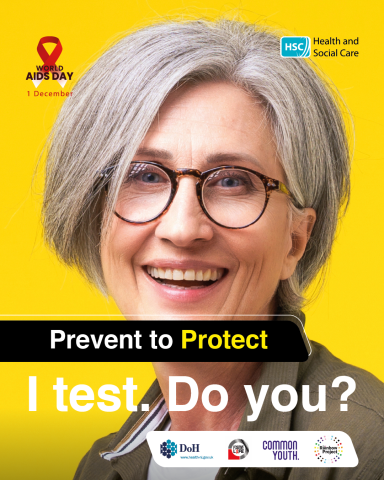World AIDS Day: prevention key to stopping spread

Ahead of World AIDS Day on 1 December, the Public Health Agency (PHA) is highlighting the vital role that simple actions play in helping to prevent the spread of HIV.
The latest statistics show that in 2024 there were 1,439 people living with a HIV diagnosis in Northern Ireland who had accessed HIV-related care, with 101 new HIV diagnoses in that year.
This year’s theme for World AIDS Day is ‘Prevent to Protect’ and taking the steps of wearing a condom every time you have sex, getting tested if you think you might be at risk, and accessing treatment early if you are diagnosed with HIV, can all help support your health and wellbeing and reduce the spread of HIV.
Frances Dowds, Health and Social Wellbeing Manager at the PHA, said: “HIV is a viral infection that can be transmitted through sexual contact, sharing of HIV-contaminated needles and syringes, and transmission from mother to child before, during, or shortly after birth.
“HIV is most commonly transmitted sexually, which is why it is advised to always wear a condom with new partners. Using a condom correctly and consistently is one of the most effective ways to prevent the transmission of HIV during sexual activity.
“When used properly during vaginal, anal or oral sex, condoms significantly reduce the risk of HIV transmission and are effective for all genders as both external and internal condoms offer protection.
“If you think you have been at risk of getting HIV, it is important to get tested as soon as possible. Testing is the only way to know for sure if you have HIV.
“With early diagnosis and effective treatment, most people with HIV will not go on to develop AIDS.”
Acquired Immune Deficiency Syndrome (AIDS) is the final stage of HIV infection, when your body can no longer fight life-threatening infections.
You can access a home testing kit for HIV and STIs, which is completely free, discreet and confidential, at www.sh24.org.uk
For information on the symptoms of HIV and STIs, as well as information on conditions which may have no symptoms, and for details of Northern Ireland GUM clinics, visit www.sexualhealthni.info and www.nidirect.gov.uk/sexual-health
Una O’Kane, Programme Manager for Sexual Health at the PHA, said: “There are highly effective treatments available for free to people who are diagnosed with HIV, and if detected early you can lead a full and healthy life. People on effective HIV treatment cannot pass on the virus. This is known as U=U – an undetectable viral load means the virus is untransmissible.
“Treatments such as PrEP and PEP, are available for free through all GUM clinics in Northern Ireland.”
Frances concluded: “Stigma around HIV is something we all have a responsibility to address. Incorrect information may stop people from accessing treatment sooner and a person diagnosed later is more likely to experience additional impacts of the virus. Early access to testing is critical and the treatments of HIV should be communicated widely to encourage others to come forward.”
Ends
Notes to editors:
- In 2024, there were 101 new HIV diagnoses in Northern Ireland. This includes both people with new diagnoses who have been diagnosed with HIV for the first time in Northern Ireland, and people diagnosed with HIV before continuing care in Northern Ireland.
- 1,439 people who are living with a HIV diagnosis in Northern Ireland and have accessed HIV-related care in 2024. Of these individuals, 99.8% were on treatment for HIV and 96.5% of individuals with viral load results had an undetectable viral load.
- There were 101 new HIV diagnoses made in Northern Ireland residents (67 men and 34 women) in 2023; a 40% increase from 72 in 2021 but a similar number to those reported in 2022 (100). 2024 Northern Ireland HIV data (2023 data). Further details on STI and HIV diagnoses in Northern Ireland will be available in a full report in January 2026 available on www.publichealth.hscni.net
- The theme of this year’s World AIDS Day is ‘Prevent to Protect’.
- In raising awareness on World AIDS Day, the PHA works in collaboration with the Department of Health and other statutory, bodies as well as Common Youth, Positive Life and the Rainbow Project, in the community and voluntary sector.
- Pre-Exposure Prophylaxis (PrEP) is a drug taken by HIV-negative people that can help prevent someone from getting HIV.
- Post Exposure Prophylaxis (PEP) is a treatment that can stop an HIV infection after the virus has entered a person’s body. It must be taken as soon as possible after exposure but within 72 hours.
- The Needle and Syringe Exchange Service (NSES) is vital to the health and wellbeing of the entire community and helps to reduce the potential of drug-related litter and lowers the risk of HIV and other blood borne viruses within the wider population. The service also puts clients in direct contact with a health professional who can help them engage with any treatment services they may require. The NSES is a free, confidential health service for people who inject drugs and are based in areas where there is an existing pattern of people who inject, in order to help protect everyone in the community.
